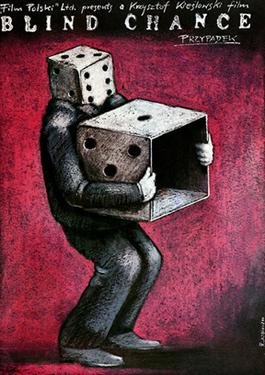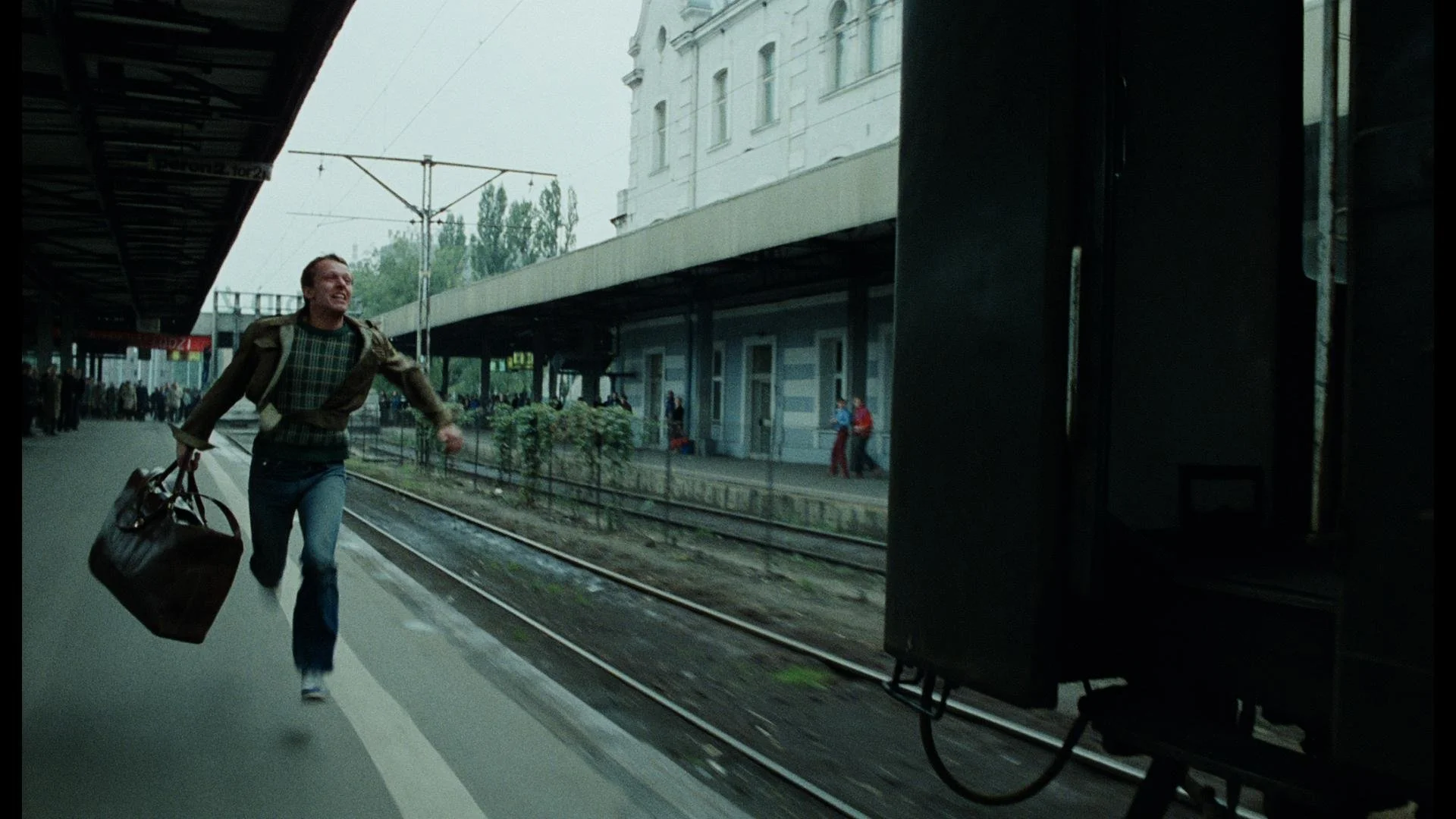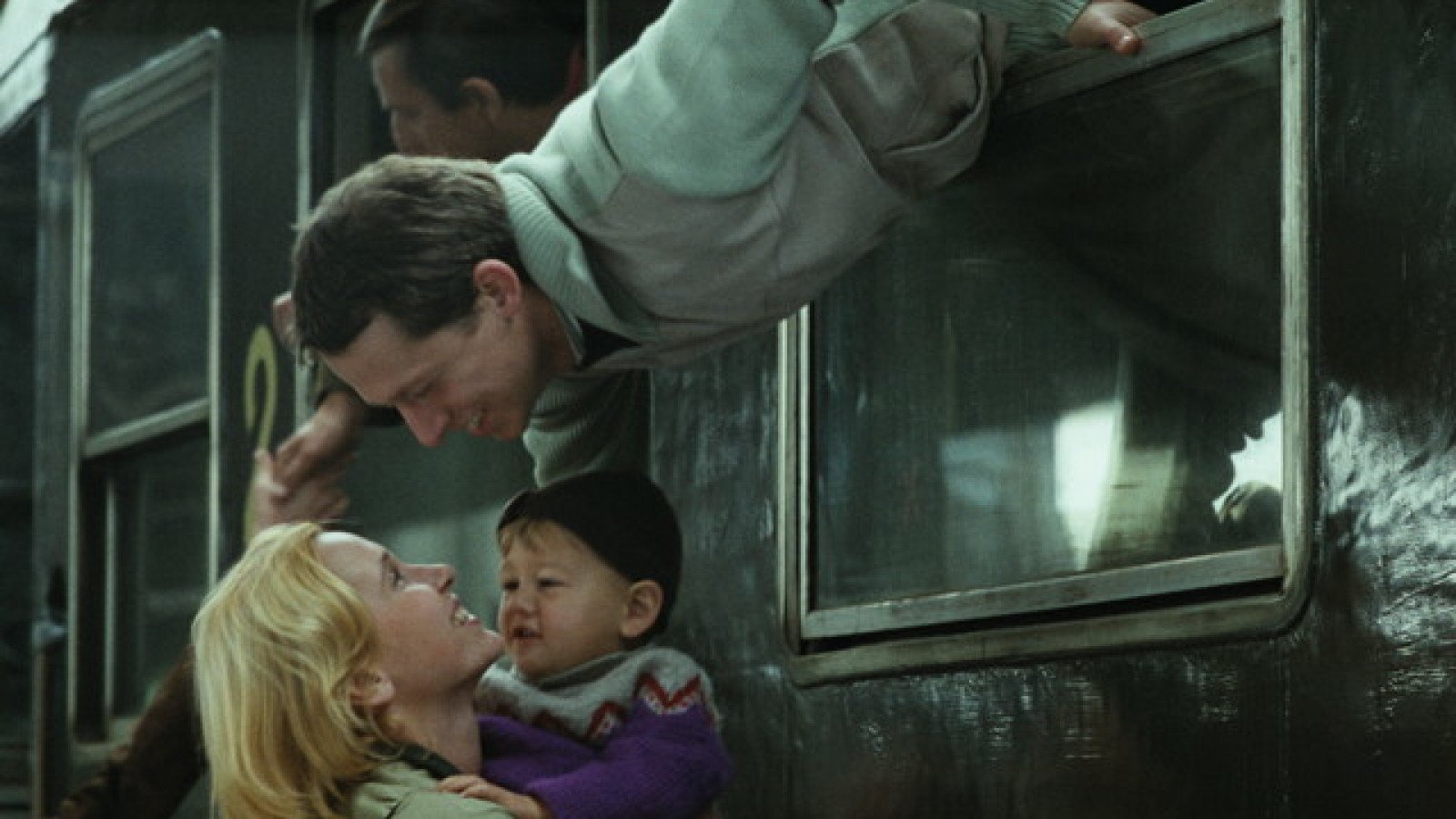SEEING THROUGH THE WORLD TO SEE THE WORLD: Blind Chance (co-wri & directed by Kryztof Kieslowski, Poland, made 1981 but released 1987)
Why are Polish movie posters are always so dope?
This writer is confounded that he didn’t know about the existence of famed Polish filmmaker Kieslowski’s feature Blind Chance until “chancing” upon it on the Criterion Channel.
Kieslowski is a personal favorite moviemaker. His 1989 masterwork The Decalogue (ten one hour movies each dealing with one of the biblical commandments, taking place in 1980’s Warsaw, made for Polish television) is one of THE great cinematic works. And works like his Three Colors trilogy: Blue, White, Red, and his features The Double Life of Veronique and Camera Buff are all incredible and nourishing.
So how did I have no idea about Blind Chance which serves as a Rosetta Stone for all the thematics of Kieslowski’s final, mature period of moviemaking (he was a documentary moviemaker largely until the 1980’s)?
Do you ever feel sometimes like you ARE living in the Matrix and suddenly they add a movie a moviemaker made that didn’t exist before just to f*@k with you? This is how I feel. But no matter. I’ve seen it now.
And it’s amazing save for one decision. But maybe I’m just wrestling with that because I wanted the decision to be something different. Maybe we, the audience, are meant to be frustrated by the decision (the filmmaker’s not Witek’s) to provoke thought. That’s my bet.
But you’ll have to see the movie to know what I’m talking about.
Run, Witek, Run!
Blind Chance is an amazing movie about young Polish doctoral student Witek (a very charismatic Bogusław Linda). When his father suddenly dies, Witek has an existential crisis, drops out of medical school, and buys a ticket to Warsaw. The movie then shows three possible different outcomes of this choice: if Witek catches the train, if he misses it and takes his anger out on a train station employee, and if he misses the train but notices a fellow female medical student on the platform just as he turns around.
In these plot specifics, the movie is very much in that sub-genre of “What if/Alternate Realities” that includes Tom Twykver’s Run Lola Run (which now seems clearly influenced by Blind Chance) or even that Gwyneth Paltrow 1998 movie Sliding Doors (which also seems Blind Chance inspired and deals with different outcomes on a train-albeit a subway train in London).
But the execution is idiosyncratically Kieslowski’s. And if you love Kieslowski movies you’re going to love this movie. All his obsessions and wonderful form & content brilliance is here. Little details and characters reappear in each story but you have to pay attention to notice when they pop up. The three stories all end on a cryptic irony that is only fully understood in the final shot. Though the movie is called Blind Chance and certainly takes this up as one of its main themes, it is also very much about Polish politics of the 1970’s, early 1980’s, romantic sexuality, human relationships, faith, and God.
In other words, the big themes.
Without giving away too much and thus spoiling the enjoyment of discovering, wrestling, interpreting this movie for yourself, the three stories are instructive to lay out in broad terms here:
In Story A, Witek becomes a rising star in the Polish Communist party but also learns the manipulative games occurring behind the scenes.
Story B is, in some ways, the most mysterious. . .
In Story B, Witek joins the anti-Communist underground, gets baptized a Catholic, and starts an affair with a married woman.
In Story C, Witek returns to being a doctor, gets married, and tries to carve a middle path as a non-affiliated independent Pole-neither Communist NOR anti-Communist.
In each story, there are joys, sorrows, and frustrations. And though each story implies just HOW different Witek’s life could be depending on the “blind chance” of the moment with the train, there are also constants. Witek is, at heart, a good person trying to do his best. In each of the stories, he has a sexually exciting romantic relationship (albeit with a different woman). In each story, he grapples with politics and religion earnestly (rather than cynically).
One of the strange twists of fate in Kieslowksi’s own life is that he himself said just before his untimely death in 1996 (at the relatively young age of 54) that he was retiring from movies because he had come to the realization that he was constantly making the same movie over and over again. And that he felt he had given all of himself to the movies he had made. Thus he said Three Colors: Red would be his last movie and. . .it was. Though he left behind a script and ideas for a new trilogy that. . .wait for it. . .Tom Twykver used to make 2002’s Heaven with Cate Blanchett.
This writer would have been just fine had Kieslowski kept making the same movies because so few moviemakers were as capable as Kieslowski at dealing with the moral, the ethical, the ambiguous, the spiritual, the transcendent but in a way that never felt didactic or corner-cutting.
In fact, if this writer has one frustration with Blind Chance, and Kieslowski may have wanted this frustration, it’s that the ending is definitely NOT crowd-pleasing. This must be the Hollywood American in me wanting a happy ending or definitive answer.
Premonitions, God, chance, ethics,. . .this movie’s got it all.
Instead, Kieslowski, in Blind Chance seems to be pointing out something deeper, more profound. That there is a kind of balance in the universe that will assert itself in mysterious ways in different contexts. When one really starts to think about the three possible directions of Witek’s life (lives?), one realizes each comes with attendant joys and sorrows. And in some unsettling ways, the greater the joys, the greater the sorrows to balance them.
David Lynch in Twin Peaks: The Return seemed to be getting at the same thing as the series started to truly reveal its hand in the later episodes.
And when two of the greatest directors of all time hit upon the same truth: maybe we’d be well advised to listen.
Whatever your philosophical bent, if you’re a movie lover and want to discover a fascinating new work of world cinema, please watch Blind Chance. It’s everything you want a rich piece of cinematic art to be: entertaining, daring, profound, humanist, emotional, stylistically exciting.
So how come I had never heard of it before?! This might be the biggest mystery of all.
Craig Hammill is the founder.programmer of Secret Movie Club.




